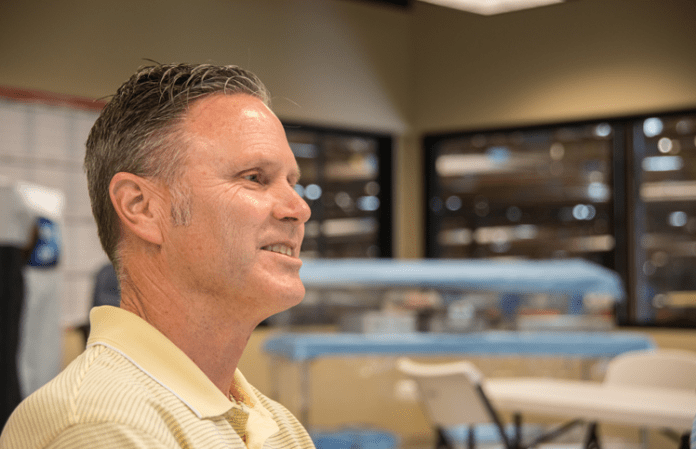Hospital-acquired infections are one of the major threats to hospital patients today. One in 25 patients in the U.S. acquires an infection associated with their hospital stay, resulting in a longer stay (19 days longer, on average) and an estimated $43,000 in additional charges, according to the Agency for Healthcare Research and Quality. While death is a real possibility due to these acute infections, increased hand washing and more intensive cleaning have been some of the only proposed solutions.
Vancouver’s Pedigo Products Inc. seeks to change that with its latest product: the Guardian Series Stretcher, the only stretcher on the market with CuVerro copper side rails. The stretcher is just the latest in a stream of products designed and manufactured by Pedigo that use bactericidal copper.
“CuVerro is a key area that nobody else is utilizing for all the high-touch points in hospitals,” said CEO Rick Pedigo. “Side rails should protect, not infect.”
As bacteria and viruses become more resistant to drugs and cleaning products, the CuVerro copper alloy – which is a mix of copper and nickel – has become a key ingredient in many of Pedigo’s products, including IV stands, transport carts and other high-touch surfaces.
“There are a lot of things these days when it comes to infection control like coatings, wipes, gels,” said Pedigo. “What’s different about CuVerro and copper is that it’s an alloy, so it’s permanent. It never wears out. It’s constantly killing bacteria and it is very easy to clean. There’s no disposable aspect to it too – it’s green.”
CuVerro bactericidal copper is the only type of material surface registered by the EPA to continuously kill bacteria, eliminating more than 99.9 percent of several seriously harmful bacteria within just two hours.
“The first line of defense is typically hand washing and cleaning,” said Randy Storm, Materials Manager at Pedigo Products, Inc. “But you can only clean so many times during the course of the day, whereas CuVerro is constantly killing germs, even in between cleanings.”
The Guardian Series Stretcher joins Pedigo’s growing line of almost 200 products, including the closed surgical case cart, CartStat biohazard indicator, patient warming cabinets, Quiet-Close™ lid dampener hamper and the Space Station, Pedigo’s two-tiered table that eliminates the need for several tables during bigger surgeries.
“If you’re not innovating, you’re falling behind and you’re not going to be a leader in your field,” said Pedigo. “We’re constantly developing products into niche areas that we believe are beneficial not only for our customers, but for us [as well].”
Rick Pedigo’s grandfather, William R. Pedigo, started the company on his dirt-floor garage in 1947. The design and manufacturing company grew in California until 1993, when its headquarters moved to Vancouver.
Many of Pedigo’s products have been developed from customer feedback and modifications made for individual hospitals. Pedigo’s dedicated engineering team works directly with its customer service team to discover what customizations could be useful in all hospitals. Ergonomics, ease of transport and hospital compliance regulations are huge factors when developing new products.
All Pedigo products are manufactured at the company’s Vancouver plant. Of its 145 local employees, 120 work directly on the manufacturing floor, operating massive machinery and working with raw materials to create the healthcare devices from scratch.
“Our employees are really proud of the fact that they’re contributing to a product that affects patient outcomes,” said Storm. “It’s not just manufacturing, it’s manufacturing with a purpose.”
Pedigo employees stay for the long run, some clocking nearly 40 years with the company. Pedigo’s long-standing values permeate company culture and manufacturing processes. Pedigo Green, for example, is an environmental initiative seen company wide.
“A lot of our larger products are shipped without pallets, wheeled onto a truck, wrapped in blankets and delivered to the facility,” said Pedigo. “So the facilities don’t have any recycling or disposal of shipping material to worry about.”
Most of the fluids Pedigo uses in its manufacturing processes are water-based instead of oil-based and are easily recycled. All steel and stainless steel scrap and cardboard packaging gets recycled or reused.
“Almost all of our stainless steel sheet comes with a paper sheet separating the pieces to prevent scratching of their parts,” Storm said. “We reuse that paper many, many times until it is torn or worn out.”
One challenge Pedigo faces is a shortage of skilled laborers. The company works with local high schools and community colleges to show students that this high paying career is achievable after obtaining just a two-year degree.”
Another challenge is new taxes, resulting from the Affordable Care Act, that cannot be passed onto the consumer. However, the ACA will also financially penalize hospitals that have high hospital-acquired infection rates.
“In the end, the Affordable Care Act will be a good thing because it’s going to put pressure on costs,” said Pedigo. “Anytime you do that, people come up with alternatives and better ways of doing things.”
When compared to updating medical equipment versus the cost of shutting down and cleaning an entire hospital due to an infection outbreak, like the recent Norovirus outbreak at Doernbecher’s Children’s Hospital, Pedigo thinks hospitals will see the benefit of using products engineered to inherently stop and prevent the spread of infection.
“Just about every country has a Pedigo product in it,” said Rich. “It may not be as much as we’d like, but they all have at least one of our products.”
Pedigo believes this foundation as a trusted medical brand, coupled with the company’s current innovation, will only increase demand for their products throughout the healthcare industry.




